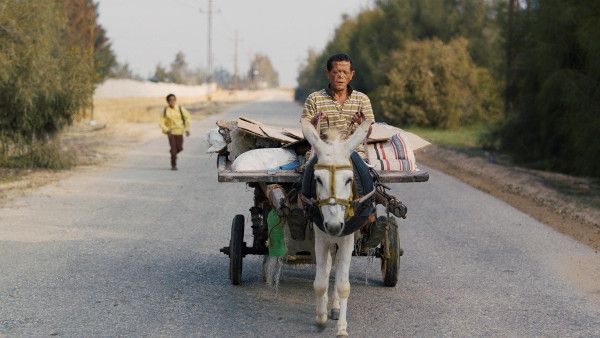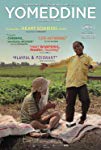Eye For Film >> Movies >> Yomeddine (2018) Film Review
Yomeddine
Reviewed by: Amber Wilkinson

Road trips don't get much quirkier than the one in Abu Bakr Shawky's Yomeddine, which tackles the real-life issue of stigmatisation through a warm and gentle fable that rests on the importance of family - which may not be dependent on blood. Beshay (Rady Gamal, a non-professional actor like everyone in the cast) suffered from leprosy as a child and, although cured, has been left badly disfigured by the disease.
Now living in a leper colony, Beshay makes a living by scavenging what he can in the local dump, throwing what he finds on the cart pulled by his trusty donkey Haby and sometimes helped by young orphan boy Obama (Ahmed Abdelhafiz). This might sound grim on paper, but Shawky ensures it is far from a hard-luck set-up as Beshay is quickly shown to have a strong sense of humour and humanity and to be well liked within the community. He may not earn a fortune but he's not living in abject poverty either.

Shawky, who draws on his documentary background for his first fiction feature, nudges the plot into action with the death, early on, of Beshay's wife (Shoq Emara), which leads to the re-emergence of questions about the family who abandoned him at the colony many years before. Soon he's packed up and on the road with Obama as a stowaway and we watch as the pair make their way south towards his hometown of Qena, near Luxor.
Gamal, who was cast in the leper colony where Shawky shot his earlier documentary The Colony, is commanding at the film's heart. It's testimony both to Gamal's natural charisma and the director's talent, as the pair spent months developing the character, which must have been made a more complex process by the fact that, in real life, Gamal can't read.
Road trips, of course, always contain a fair number of familiar stopping points and sign posts and this is no different, as this odd couple of travellers face their fair share of prejudice and soul-searching along the way. But Shawky allows his characters to sit firmly in the driving seat, so that we are absorbed in Beshay's reconsideration of his place in the world, and he is shot with care and attention by Federico Cesca, whose camerawork is as warm to its characters as Shawky's script. Although straying close to sentimentality on occasion - perhaps heaping just a little too much more low-level misfortune on his characters than he needs to - the writer/director largely takes a restrained approach that allows Gamal and Abdelhafiz's winning double act to glow in the light.
Reviewed on: 06 Aug 2019















